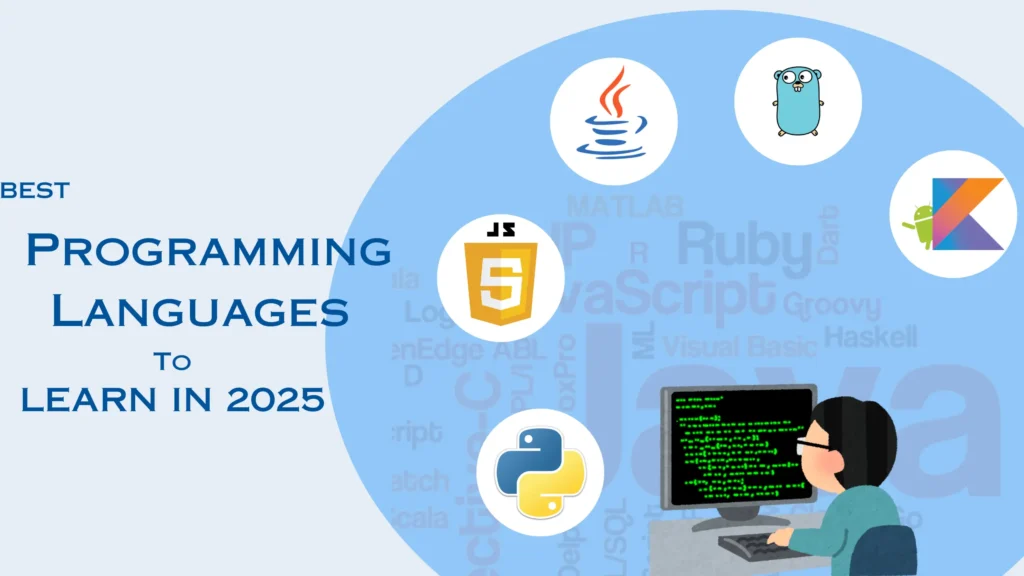The demand for the programming language depends on industrial trends, technologies, and business needs. Understanding these factors before selecting the programming language.
In this guide, we’ll explore the top programming languages to learn in 2025 based on industry trends, job market demand, and real-world applications. Whether you’re aiming for a high-paying career in software engineering or improving your coding skills, this list will help you make the right decision.

Best Programming Languages to Learn
The listing programming languages are demanding languages in 2025. So select anyone to learn to build your career.
1. Python
Python is a highly advanced and beginner-friendly programming language. That is widely used in multiple sectors for its simplicity and readability. It is ideal for beginners and easy to learn and it has extensive libraries, frameworks, and strong community support.
Use Cases:
- Artificial Intelligence & Machine Learning – TensorFlow and PyTorch frameworks are used.
- Data Science & Analytics – Pandas and NumPy make handling large datasets.
- Web Development – Django and Flask help to build applications.
- Automation & Scripting – Automating repetitive tasks saves time .
Pros:
It is an advanced programming language and is widely used. It has a larger ecosystem of libraries and it has cross-platform capability.
Cons:
The execution speed is slow compared to other compiled languages like C++ and it’s not ideal for mobile app development.
If you’re a beginner or an experienced developer, Python’s vast ecosystem and community support make it an excellent choice.
2. JavaScript
JavaScript is an important programming language for web development and its scripting language for Creating dynamic and interactive web pages. The internet is run on javascript that’s the reason important programming languages include JavaScript.
Use Cases:
- Front-end web development – React and Vue.js frameworks help to enhance user experiences.
- Back-end development – Node.js helps to run the JavaScript on the server side.
- Mobile app development- React Native are used in mobile development.
Pros:
JavaScript is an essential programming language for web development in both frontend and backend. It has a large community and ecosystem with cross-platform compatibility.
Cons:
The drawback of JavaScript is very difficult to debug the code and it does not support multiple inheritance for reuse of the code.
3. Java
The object-oriented programming language of Java is class based programming language and it’s known for portability and robustness. The key future of Java is once write the code and run anywhere using JVM and it has strong memory management and garbage collection.
Use Cases:
- Enterprise-level applications- Java is a popular choice for developing enterprise-level applications. Spring and Hibernate Frameworks are used to develop it.
- Android app development- Java is the primary language for developing Android apps because it provides multiple sets of APIs and tools for developing low-level to high-level mobile applications.
- Web applications- In web application development Java is the best programming language because it provides multiple tools and frameworks for creating secure web applications.
Pros:
It’s a platform-independent programming language and high performance with scalability support and also has multithreading support.
Cons:
Java is a powerful language but it also has drawbacks like slower performance compared to other languages like C++, high memory conception and it does not support backup facility.
4. Go (Golang)
Go is open source and compiled programming language developed by Google for fast compilation and execution. It’s particularly developed for cloud infrastructure, microservice, and networking.
Use Cases:
- High-Performance Applications – It has efficient memory management and compiler time is faster than Python and is more user-friendly than C++.
- Microservices –Go is the best choice for developing microservices because it’s lightweight and efficient concurrency.
Pros:
It is high performance and efficient programming language, easy to learn and use, and supports a strong library.
Cons:
It has only limited libraries available compared to other old languages and is less suitable for GUI applications.
5. Kotlin
Whether you start a career in Android development choose Kotlin programming language. It is statically typed and fully interoperable with Java and runs on the Java Virtual Machine. Google announced official language for Android development is Kotlin.
Use Cases:
- Android Development: Kotlin programming language is specially designed for Android development and most Android developers prefer this language for its concise and expressive Syntex.
- Multiplatform: Multiplatform support is the reason for successful programming language in Android development. It’s run on different platforms like JavaScript, JVM, Webassembly, and native code.
Pros:
It is a modern programming language and easy to learn and it reduces the lines of code compared to other programming languages and time-saving for developers.
Cons:
The compiler time is high compared to other programming languages it takes more time for every compiling process and the community is very small compared to Java.
Conclusion
Every programming language is important it depends on your career. So select the right career and choose the right programming language to learn. Choose any one language to learn in depth build your career and improve your skills.
See Also: Best Tools for Software Developers
1 thought on “Best Programming Languages to Learn in 2025”